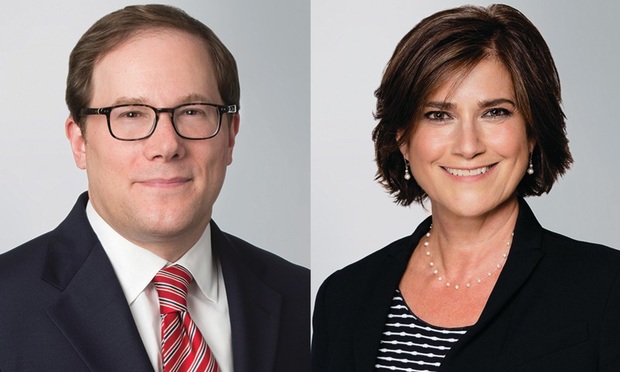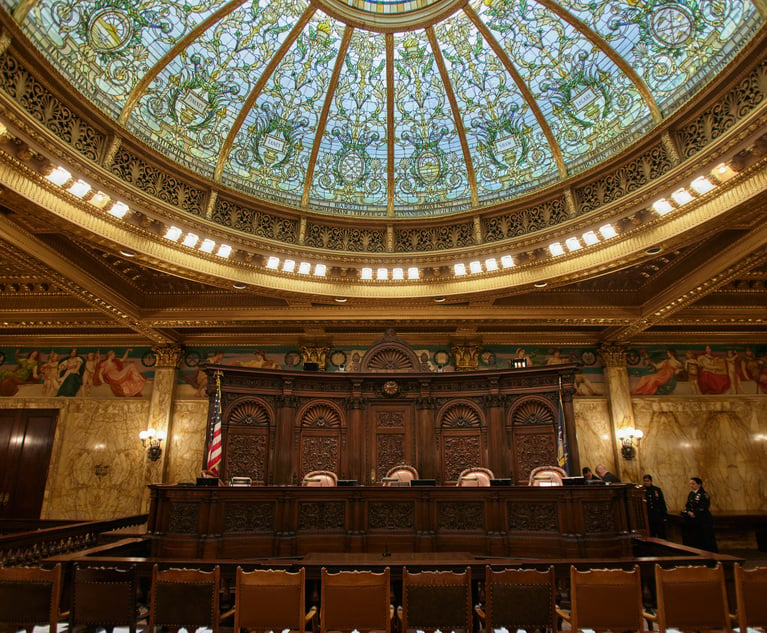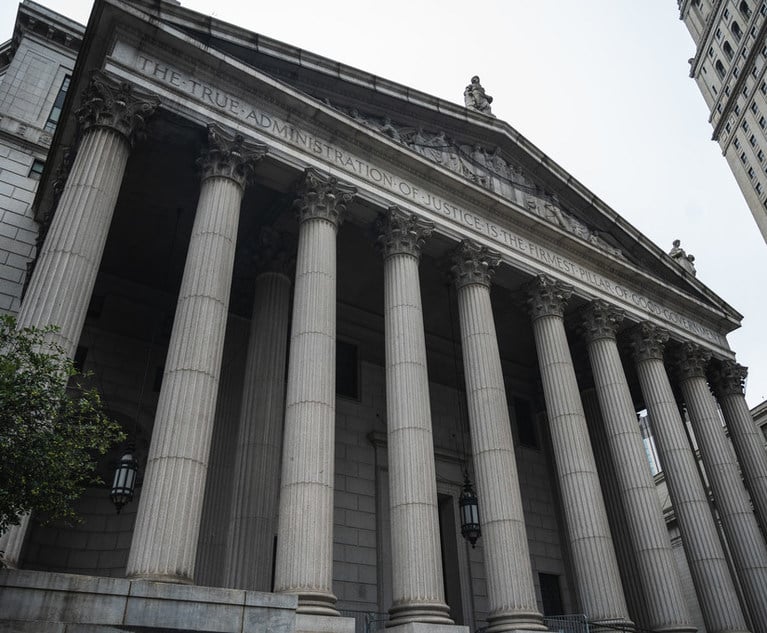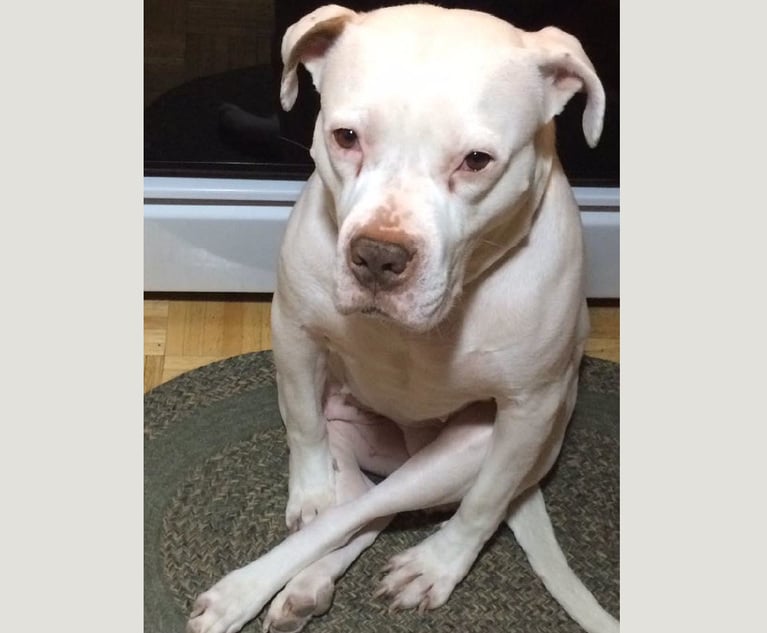COVID-19 Securities Class Action Risks: Present and Future
In their Corporate and Securities Litigation, Margaret A. Dale and Mark D. Harris discuss the most recent putative class action lawsuits related to COVID-19, and concludes by evaluating implications for future lawsuits.
June 15, 2020 at 12:07 PM
8 minute read
 Mark D. Harris and Margaret A. Dale
Mark D. Harris and Margaret A. Dale
As the global economy surges up and down, companies continue to work to represent accurately to their investors the current state of affairs. Given the turmoil in the markets, an increasing number of plaintiffs are bringing shareholder class action suits, citing corporate statements about COVID-19. Oftentimes, these lawsuits point to statements from the company's most recent SEC filings or associated press releases, and argue that the company knew that those statements were false or materially misleading based on actions that the company took not long after its reporting date. As first-quarter earnings season draws to a close, now is a good time to reflect on the shareholder class actions that have been brought to date related to COVID-19, and others potentially yet to come.
This article begins by discussing the most recent putative class action lawsuits related to COVID-19, and concludes by evaluating implications for future lawsuits.
Colony Capital, Inc. Litigation. On May 26, the plaintiffs filed a securities-fraud class action lawsuit against Colony Capital, Inc., a global investment firm with a focus on digital real estate, and several of its officers, in the Central District of California. The lawsuit alleges, in part, that Colony made statements in its recent public filings (4Q2019 10-Q, 2019 10-K), and associated earnings calls and press releases that painted a rosy picture of the company's health care and hospitality segments and their respective liquidity positions. For example, the complaint cites the 4Q2019 press release and the 2019 10-K, which both purportedly stated that "with respect to the health care and hospitality units, the Company successfully addressed all material near-term debt maturities allowing the respective business unit leaders to focus on improving cash flows through operational management and capital expenditures."
The complaint continues that the "truth" came to light in the following months, when the company disclosed that its health care and hospitality portfolio companies had defaulted on more than $3 billion in debt as a "result of the economic fallout from COVID-19." The complaint alleges that the company's public statements regarding its health care and hospitality segment were overly optimistic and materially misleading as they failed to disclose that the portfolio companies in those segments "carried unsustainable levels of debt secured by hotels and health care-related properties and were thus at a significant risk of default" due to the prospective impact of COVID-19. The company disclosed the default in its May 8 press release, after which Colony's stock price fell $0.08 per share, or 3.81%, to close at $2.02 per share on May 8.
Sorrento Therapeutics, Inc. Litigation. On May 26, the plaintiffs filed a securities-fraud class action lawsuit against Sorrento Therapeutics, Inc. and several of its officers in the Southern District of California. Sorrento had been developing COVID-19 antibody products that could potentially be used to "block and neutralize" the virus in at-risk populations and recently infected individuals. The complaint focuses on May 15, when the company issued a press release allegedly stating that the antibody "demonstrated 100% inhibition" of virus infections, and when the CEO gave an interview where he characterized the breakthrough as a "cure." After these statements the company's share price increased more than 280%.
According to the complaint, two reports were issued the week after the press release that demonstrated that Sorrento's statements were materially misleading. On May 20, Hindenburg Research published an article quoting Sorrento's hospital collaborator, who discounted Sorrento's claims as "very hyped." Two days later, BioSpace published an article recounting a May 21 interview with the company's CEO, where the CEO characterized Sorrento's antibody product as a "potential cure" that would not be effective for late-stage patients. The complaint argues that Sorrento's initial statements were misleading and lacked a reasonable basis in that they did not disclose that the company's initial finding of "100% inhibition" in an in vitro virus infection would not necessarily translate to success or safety in vivo, or in person; and the company's finding did not indicate that the product would "cure" all COVID-19 patients. After the second article, was published the company's share price had declined nearly 50% from its high several days earlier.
Carnival Cruise Lines Litigation. On May 27, the plaintiffs filed a securities-fraud class action lawsuit against Carnival Corporation and several of its officers in the Southern District of Florida. The premise of the complaint is that Carnival made certain statements in its 2019 10-K and subsequent press releases regarding the extent of the virus's spread, Carnival's adherence to its own health and safety protocols, its adherence to port-of-call regulations, and its role in facilitating the virus's spread that were materially misleading given the company's course of conduct. For instance, the complaint identifies as materially misleading statements by Carnival that the "safety of guests and employees [and] compliance" was a "top priority," and a statement that the company had not "had a diagnosed case linked to [its] operation" as of March 13.
According to the complaint, the falsity of these statements was revealed in a series of news articles. First, on April 16, Bloomberg News suggested that Carnival "failed to take timely action after being apprised of COVID-19 threats to its fleet and passengers," contrary to its statements that "the health and safety" of its passengers and crew was a top priority. Next, a May 1 Wall Street Journal article purportedly revealed that a passenger on the Diamond Princess was being treated for COVID-19 as early as February. The article also alleged that when another ship's medical staff was questioned by emergency room personnel, the staff denied any passengers being sick with COVID-19—despite knowing that several crewmen were currently being quarantined. The WSJ article also noted several government agencies that had begun to investigate Carnival. The complaint contends that Carnival's previous statements were materially misleading because the company did not disclose the increase in reported COVID-19 events aboard the cruise ships, Carnival's failure to adhere to applicable policies, and the fact that its continued operation was increasing the spread of COVID-19. The company's stock fell 4.2% after the Bloomberg article and 12.4% in response to the WSJ article.
These are only the most recent examples of securities-fraud class action lawsuits involving COVID-19. Already in March and April of this year, plaintiffs had initiated several similar lawsuits:
- Norwegian Cruise Lines. On March 12, Norwegian became the first company to face a COVID-19 securities class action. Somewhat similar to Carnival, the plaintiffs alleged that Norwegian continued to operate its business without regard to the risks posed by COVID-19, including employing sales representatives who provided false information to encourage customers to not cancel cruises.
- Inovio Pharmaceuticals. Inovio was also sued on March 12. The lawsuit is similar to that against Sorrento—it alleges false and misleading statements made in connection with a COVID-19 vaccine that Inovio is developing.
- SCWorx Corp. SCWorx presents a slightly different issue from those discussed above—revenue projections. On April 29, the plaintiffs filed a complaint alleging that SCWorx falsely represented that it had received an exceptionally large purchase order of COVID-19 rapid testing kits, with provisions for substantial additional weekly orders. A news report cast doubt on the company's claims, and the stock price fell more than 17%.
It is all but certain that more lawsuits are to come. As companies continue to navigate the difficult reporting landscape in the COVID-19 era, and prepare themselves for second-quarter earnings reports, the cases described above can provide useful guidance.
- Valuation. While the case against Colony Capital was based in part on debt default, other plaintiffs may go after companies for overvaluation on other grounds. The coronavirus pandemic will have far-reaching economic consequences, many of which are still unclear, yet companies (such as publicly traded asset managers) will still be required to value their privately held assets. Given the uncertainty surrounding those valuations, plaintiffs are likely combing disclosures looking for vulnerabilities.
- Prediction and Guidance. Future forecasting is another area of concern. As SCWorx's experience shows, companies may be vulnerable to lawsuits based on allegedly inflated economic predictions. This applies with equal force in the health care and pharmaceutical context where companies should be careful to have a reasonable basis for any statements regarding future prospects, along with the appropriate disclaimers.
- Additional Expenses. As of now, no class action lawsuits have been premised on unforeseen expenses due to COVID-19. However, where companies are spending significant sums of money that would foreseeably alter the company's previously stated guidance, or materially altering the company's publicly stated business plan, these expenses could expose the company to class action litigation absent the appropriate disclosures and disclaimers.
As these cases highlight, companies must be especially careful in their public statements during and about the pandemic. Where appropriate, silence may be the best safeguard.
Margaret A. Dale and Mark D. Harris are partners at Proskauer Rose. Brian A. Hooven, an associate at the firm, contributed to the writing of this article.
This content has been archived. It is available through our partners, LexisNexis® and Bloomberg Law.
To view this content, please continue to their sites.
Not a Lexis Subscriber?
Subscribe Now
Not a Bloomberg Law Subscriber?
Subscribe Now
NOT FOR REPRINT
© 2025 ALM Global, LLC, All Rights Reserved. Request academic re-use from www.copyright.com. All other uses, submit a request to [email protected]. For more information visit Asset & Logo Licensing.
You Might Like
View All
Decision of the Day: Trial Court's Sidestep of 'Batson' Deprived Defendant of Challenge to Jury Discrimination

Decision of the Day: Commercial Division Finds Defendant Engaged in Unfair Competition Against Plaintiff

Decision of the Day: Court Rules on Judgment Motions Over Police Killing of Pet Dog While Executing Warrant

Decision of the Day: JFK to Paris Stowaway's Bail Revocation Explained
Law Firms Mentioned
Trending Stories
- 1Uber Files RICO Suit Against Plaintiff-Side Firms Alleging Fraudulent Injury Claims
- 2The Law Firm Disrupted: Scrutinizing the Elephant More Than the Mouse
- 3Inherent Diminished Value Damages Unavailable to 3rd-Party Claimants, Court Says
- 4Pa. Defense Firm Sued by Client Over Ex-Eagles Player's $43.5M Med Mal Win
- 5Losses Mount at Morris Manning, but Departing Ex-Chair Stays Bullish About His Old Firm's Future
Who Got The Work
J. Brugh Lower of Gibbons has entered an appearance for industrial equipment supplier Devco Corporation in a pending trademark infringement lawsuit. The suit, accusing the defendant of selling knock-off Graco products, was filed Dec. 18 in New Jersey District Court by Rivkin Radler on behalf of Graco Inc. and Graco Minnesota. The case, assigned to U.S. District Judge Zahid N. Quraishi, is 3:24-cv-11294, Graco Inc. et al v. Devco Corporation.
Who Got The Work
Rebecca Maller-Stein and Kent A. Yalowitz of Arnold & Porter Kaye Scholer have entered their appearances for Hanaco Venture Capital and its executives, Lior Prosor and David Frankel, in a pending securities lawsuit. The action, filed on Dec. 24 in New York Southern District Court by Zell, Aron & Co. on behalf of Goldeneye Advisors, accuses the defendants of negligently and fraudulently managing the plaintiff's $1 million investment. The case, assigned to U.S. District Judge Vernon S. Broderick, is 1:24-cv-09918, Goldeneye Advisors, LLC v. Hanaco Venture Capital, Ltd. et al.
Who Got The Work
Attorneys from A&O Shearman has stepped in as defense counsel for Toronto-Dominion Bank and other defendants in a pending securities class action. The suit, filed Dec. 11 in New York Southern District Court by Bleichmar Fonti & Auld, accuses the defendants of concealing the bank's 'pervasive' deficiencies in regards to its compliance with the Bank Secrecy Act and the quality of its anti-money laundering controls. The case, assigned to U.S. District Judge Arun Subramanian, is 1:24-cv-09445, Gonzalez v. The Toronto-Dominion Bank et al.
Who Got The Work
Crown Castle International, a Pennsylvania company providing shared communications infrastructure, has turned to Luke D. Wolf of Gordon Rees Scully Mansukhani to fend off a pending breach-of-contract lawsuit. The court action, filed Nov. 25 in Michigan Eastern District Court by Hooper Hathaway PC on behalf of The Town Residences LLC, accuses Crown Castle of failing to transfer approximately $30,000 in utility payments from T-Mobile in breach of a roof-top lease and assignment agreement. The case, assigned to U.S. District Judge Susan K. Declercq, is 2:24-cv-13131, The Town Residences LLC v. T-Mobile US, Inc. et al.
Who Got The Work
Wilfred P. Coronato and Daniel M. Schwartz of McCarter & English have stepped in as defense counsel to Electrolux Home Products Inc. in a pending product liability lawsuit. The court action, filed Nov. 26 in New York Eastern District Court by Poulos Lopiccolo PC and Nagel Rice LLP on behalf of David Stern, alleges that the defendant's refrigerators’ drawers and shelving repeatedly break and fall apart within months after purchase. The case, assigned to U.S. District Judge Joan M. Azrack, is 2:24-cv-08204, Stern v. Electrolux Home Products, Inc.
Featured Firms
Law Offices of Gary Martin Hays & Associates, P.C.
(470) 294-1674
Law Offices of Mark E. Salomone
(857) 444-6468
Smith & Hassler
(713) 739-1250






